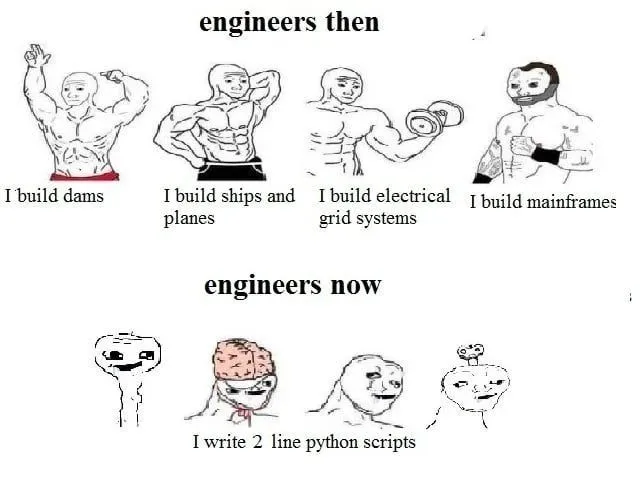What I want to become Vs What I do
What I want to become Vs What I do


What I want to become Vs What I do


You're viewing a single thread.
Software engineering is just what any "engineering" field would be if they didn't have standards. We have some geniuses and we have some idiots.
Mechanical engineers, civil engineers, electrical engineers, etc. are often forced to adhere to some sort of standard. It means something to say "I'm a civil engineer" (in most developed nations). You are genuinely liable in some instances for your work. You have to adhere to codes and policies and formats.
Software engineering is the wild west right now. No rules. No standards. And in most industries we may never need a standard because software rarely kills.
However, software is becoming increasingly important in our daily lives. There will likely come a day wherein similar standards take precedence and the name "software engineer" is only allowed to those who adhere to those standards and have the proper certs/licenses. I believe Canada already does this.
Software engineers would be responsible for critical software, e.g: ensuring phones connecting to an emergency operator don't fail, building pacemakers, securing medical records, etc. I know some of these tasks already have "experts" behind them. But I don't think software has any licensing/governing.
Directly opposed to "engineering" would be the grunt work which I do.
Software engineering does have standards and methods to developing software. These standards and methods are applied in Defence and Aerospace applications. Software engineering was developed or conceived by NATO to manage the increasing complexity of software development.
The big problem is people often confuse software development or programming with software engineering. Calling anyone that programs a software engineer. This isn't the case. It's entirely possible to be a software engineer without knowing how to code (but impractical).
Well that's my point. The term "engineer" is protected in a lot of other industries but not software.
"because software rarely kills" Depends on what you mean by rarely. Therac-25 was extremely dangerous due to a software bug. And this was over 40 years ago.
Industrial robot accidents are a lot more common than needed and almost all are due to software "problems" (bad path planning, bad safety implementation, or just bugs in the control system software)
Yes these things kill less than guns, or cars, or cranes, etc. But they still have affect in a lot of those accidents.
There are very few things anymore that don't have some kind of logic built into them. Be it software or analog logic, it was still "programmed" or designed. If there was something missed in design, that can easily have adverse affects that can lead to accidents and death not immediately attributed to the software.
I was comparing it to civil or mechanical engineering. I agree that programming/software is growing and "infiltrating" our lives. That's why I think it will become a licensed/certified term in the future. Software engineer will require a cert and some products will require certified engineers. Whereas web apps developers (most likely) will not use that title most of the time and we will just bifurcate those who work on "critical software" and those that do not.
Engineer tends to be a protected term in many countries, so software engineer is no exception. It’s words like “programmer” or “developer” which are probably unregulated
The weird thing is that engineer is a protected term in Canada but every software dev title I've had so far includes it anyway. It doesn't seem enforced at all here
I honestly thought there was too, my official job title / offer includes it in the role, despite the role explicitly having no requirement for an engineering degree.
I always found it funny, how I could do a 4 year electrical engineering degree, then work as an electrical engineer for 4 years, but never do my final law/ethics exam so couldn't call myself an electrical engineer, but could just teach myself python and call myself a software engineer, turns out I was wrong.
It is awkward though, especially in a remote work world, given that we compete directly against American "software engineers" for the exact same jobs.
As a software "engineer" and civil EIT, I endorse this comment.
I'd be very interested in learning more about how Canada manages "software engineer." Because whatever is being done certainly doesn't seem to include mandating where regulated professionals must be employed or punishing failures.
Saskatchewan's electronic health records system (eHealth) has had a couple of egregious failures that it shouldn't have taken a "software engineer" to prevent.
Several 911 services became unavailable during an outage that happened to also disrupt point of sale payment systems nationwide.
Both of the relevant companies are telecommunications companies (Telus and Rogers, respectively), where one would expect "software engineering" to be conducted by "software engineers" regardless of regulation.
A quick search for breaches in critical personal information will show that Canada is performing about as well as the US. Which is to say, abysmally.
Software without standards. Am I replying to a person who writes his own OS to run hello world?
Cause if you don't forget your own stainless steel, you can't be trained on proper defibrillator techniques?
There are definitely quality certifications for software. Plenty of govt acquisitions contracts require such certifications. We probably aren't far from laws or executive mandates which require such things tbh